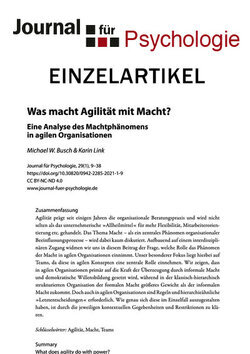30 Seiten, PDF-E-Book
Erschienen: Juni 2021
Bestell-Nr.: 34062
https://doi.org/10.30820/0942-2285-2021-1-9
abonnieren
Michael W. Busch & Karin Link
Was macht Agilität mit Macht? (PDF)
Eine Analyse des Machtphänomens in agilen Organisationen
Sofortdownload
Dies ist ein E-Book. Unsere E-Books sind mit einem personalisierten Wasserzeichen versehen,
jedoch frei von weiteren technischen Schutzmaßnahmen (»DRM«).
Erfahren Sie hier mehr zu den Datei-Formaten.
Agilität prägt seit einigen Jahren die organisationale Beratungspraxis und wird nicht selten als das unternehmerische »Allheilmittel« für mehr Flexibilität, Mitarbeiterorientierung etc. gehandelt. Das Thema Macht – als ein zentrales Phänomen organisationaler Beeinflussungsprozesse – wird dabei kaum diskutiert. Aufbauend auf einem interdisziplinären Zugang widmen wir uns in diesem Beitrag der Frage, welche Rolle das Phänomen der Macht in agilen Organisationen einnimmt. Unser besonderer Fokus liegt hierbei auf Teams, da diese in agilen Konzepten eine zentrale Rolle einnehmen. Wir zeigen, dass in agilen Organisationen primär auf die Kraft der Überzeugung durch informale Macht und demokratische Willensbildung gesetzt wird, während in der klassisch-hierarchisch strukturierten Organisation der formalen Macht größeres Gewicht als der informalen Macht zukommt. Doch auch in agilen Organisationen sind Regeln und hierarchieähnliche »Letztentscheidungen« erforderlich. Wie genau sich diese im Einzelfall auszugestalten haben, ist durch die jeweiligen kontextuellen Gegebenheiten und Restriktionen zu klären.
Abstract:
Organizational agility has emerged as a central topic in organizational consulting practice recently. Very often agile concepts are seen as the entrepreneurial »panacea« for more flexibility, employee orientation, etc. However, the topic of power in agile contexts is hardly discussed in contemporary literature. Based on an interdisciplinary approach, this article discusses the question of what role the phenomenon of power plays in agile organizations. We thereby focus on teams, as teams play a central role in agile concepts. We show that while in classically hierarchical organizations formal power is more important than informal power, agile organizations primarily rely on the power of persuasion through informal power and democratic decision-making. Still, formal rules and hierarchy-like »final decisions« play an essential role also in agile contexts. How these formal rules and »final decisions« could best be shaped relies on the respective contextual conditions and restrictions.
Abstract:
Organizational agility has emerged as a central topic in organizational consulting practice recently. Very often agile concepts are seen as the entrepreneurial »panacea« for more flexibility, employee orientation, etc. However, the topic of power in agile contexts is hardly discussed in contemporary literature. Based on an interdisciplinary approach, this article discusses the question of what role the phenomenon of power plays in agile organizations. We thereby focus on teams, as teams play a central role in agile concepts. We show that while in classically hierarchical organizations formal power is more important than informal power, agile organizations primarily rely on the power of persuasion through informal power and democratic decision-making. Still, formal rules and hierarchy-like »final decisions« play an essential role also in agile contexts. How these formal rules and »final decisions« could best be shaped relies on the respective contextual conditions and restrictions.
Andrea Birbaumer & Ralph Sichler S. 3–8Editorial (PDF)
Agile Organisationen - Versuch einer kritischen BestandsaufnahmeMichael W. Busch & Karin Link S. 9–38Was macht Agilität mit Macht? (PDF)
Eine Analyse des Machtphänomens in agilen OrganisationenPhanmika Sua-Ngam-Iam & Stefan Kühl S. 39–71Das Wuchern der Formalstruktur (PDF)
Funktionen und Folgen holakratisch formalisierter OrganisationFinn-Rasmus Bull & Judith Muster S. 72–92Hierarchie im Spannungsfeld konkurrierender Erwartungen (PDF)
Folgen der Einführung postbürokratischer Arbeitsweisen in GroßorganisationenMareike HattendorfS. 93–119Die Aktualität des Agilen (PDF)
Qualitative Forschung im Bereich digitaler DienstleistungsunternehmenFranziska Espinoza & Sabine Mommartz S. 120–146Sehnsucht Agilität (PDF)
Eine Klärung des Agilitätsbegriffs und eine Einführung in die Patterns of Integrated OrganizationJenny KipperS. 147–168Pädagogische Elemente in agilen Methoden - inwieweit lernen Organisationen im agilen Arbeiten? (PDF)
Eine empirische Untersuchung der agilen Vorgehensweise ScrumHendrik Küster & Marius Raab S. 169–190»Im Overwrite-Modus überstürmt« (PDF)
Optimierte Stressgestaltung und Belastungserfahrungen in agil organisierten Start-ups
Agile Organisationen - Versuch einer kritischen BestandsaufnahmeMichael W. Busch & Karin Link S. 9–38Was macht Agilität mit Macht? (PDF)
Eine Analyse des Machtphänomens in agilen OrganisationenPhanmika Sua-Ngam-Iam & Stefan Kühl S. 39–71Das Wuchern der Formalstruktur (PDF)
Funktionen und Folgen holakratisch formalisierter OrganisationFinn-Rasmus Bull & Judith Muster S. 72–92Hierarchie im Spannungsfeld konkurrierender Erwartungen (PDF)
Folgen der Einführung postbürokratischer Arbeitsweisen in GroßorganisationenMareike HattendorfS. 93–119Die Aktualität des Agilen (PDF)
Qualitative Forschung im Bereich digitaler DienstleistungsunternehmenFranziska Espinoza & Sabine Mommartz S. 120–146Sehnsucht Agilität (PDF)
Eine Klärung des Agilitätsbegriffs und eine Einführung in die Patterns of Integrated OrganizationJenny KipperS. 147–168Pädagogische Elemente in agilen Methoden - inwieweit lernen Organisationen im agilen Arbeiten? (PDF)
Eine empirische Untersuchung der agilen Vorgehensweise ScrumHendrik Küster & Marius Raab S. 169–190»Im Overwrite-Modus überstürmt« (PDF)
Optimierte Stressgestaltung und Belastungserfahrungen in agil organisierten Start-ups

